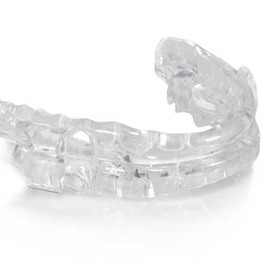
When you first learned about oral appliances for sleep apnea, you might have been excited — finally, a more convenient option than CPAP! But after you got your oral appliance, did you find that it wasn’t as easy to use as you anticipated? That’s quite common. Fortunately, adjusting to your new appliance isn’t difficult and shouldn’t take more than a few weeks. Let’s talk about some common side effects of oral appliances and what you can do to adapt to your treatment as quickly as possible.
Common Side Effects of Oral Appliances
Patients who are new to oral appliance therapy may experience a range of side effects, but some of the most common include:
- Discomfort and tightness. The plastic may feel odd in your mouth at first, and tightness is often a sign that the appliance is well-fitted.
- Drooling. Any time you put a foreign object in your mouth, saliva production kicks into high gear. It’s normal if you notice some drool on your pillow in the morning.
- Gagging. If you have a strong gag reflex, your appliance might activate it.
- Nighttime removals. Some patients unconsciously remove their appliance while they are asleep. You might even accidentally throw it across the room!
How to Adjust
The keys to adjusting to your oral appliance are time, patience, and consistent use. Your body will likely adapt to it if you wear it every night for 2 – 3 weeks. Excess saliva production will slow down, your facial and jaw muscles will get used to how the appliance affects them, and nighttime removals should come to a stop as well.
If your gag reflex is troubling you, you might be able to train yourself to tolerate your oral appliance. Wear it for short periods of time while you are awake, and practice breathing through your nose while you try to make your body relax. You might even be able to desensitize your gag reflex by taking time each day to gently brush your soft palate.
Ask for Help if Necessary
If you still haven’t adjusted to your appliance after three weeks or so or consistent use, reach out to the office that provided it to you. Describe your problem, and let them know what you have tried so far to address it. They might need to adjust your appliance so it fits better or perhaps even recommend a different type of appliance altogether.
Adjusting to your oral appliance takes a bit of time, but the effort is well worth it. Once you get used to it, it can provide you with convenient, comfortable, and effective sleep apnea relief.
Meet the Practice
Dr. Mitch Conditt is a dentist with decades of experience. He focuses exclusively on helping patients conquer obstructive sleep apnea and TMD. He offers a few different types of oral appliances, all of which are made by the world’s top manufacturers. If you have questions about oral appliance therapy or how to adjust to it, he would be pleased to consult with you. Contact our friendly team at 817-527-8500.
